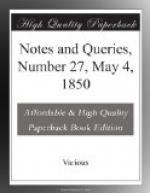“He was the first of Inglond that
gaf God his tithe
Of isshue of bestes, of londes, or of
lithe.”
P. Plouhm.
“I bed hem bothe lond and lede,
To have his douhter in worthlie wede,
And spouse here with my ring.”
K. of Tars, 124.
“For to have lond or lede,
Or other riches, so God me spede!
Yt ys to muche for me.”
Sir Cleges, 409.
“Who schall us now geve londes or
lythe,
Hawkys, or houndes, or stedys stithe,
As he was wont to do.”
Le B. Florence of Rome, 841.
“No asked he lond or lithe,
Bot that maiden bright.”
Sir Tristrem, xlviii.
In “William and the Werwolf” the cowherd and his wife resolve to leave William
“Al
here godis
Londes and ludes as ether after
her lif dawes.”
p. 4
In this poem, ludes and ledes are used indiscriminately, but most frequently in the sense of men, people. Sir Frederick Madden has shown, from the equivalent words in the French original of Robert of Brunne, “that he always uses the word in the meaning of possessions, whether consisting of tenements, rents, fees, &c.;” in short, wealth.
If, therefore, the word has this sense in old English, we might expect to find it in Anglo-Saxon, and I think it is quite clear that we have it at least in one instance. In the Ancient Laws and Institutes of England, vol. i. p. 184., an oath is given, in which the following passage occurs:
“Do spa to lane beo þe he þinum I leat me be minum ne 3ypne le þines ne laedes ne landes ne sac ne socne ne þu mines ne þeapst ne mint ic þe nan þio3.”
Mr. Thorpe has not translated the word, nor is it noticed in his Glossary; but I think there can be no doubt that it should be rendered by goods, chattels, or wealth, i.e., movable property.
This will be even more obvious from an extract given by Bishop Nicholson, in the preface to Wilkin’s Leges Saxonicae p. vii. It is part of the oath of a Scotish baron of much later date, and the sense here is unequivocal:—
“I becom zour man my
liege king in land, lith[2], life and
lim, warldly honour, homage,
fealty, and leawty, against all
that live and die.”
Numerous examples are to be found in the M.H. German, of which I will cite a few:
“Ir habt doch zu iuwere hant
Beidin liute unde lant.”
Tristr. 13934.
“Und bevelhet ir liute unde lant.”
Iwein. 2889. {432}
“Ich teile ir liute unde lant.”
Id. 7714.
And in the old translation of the Liber Dialogorum of St. Gregory, printed in the cloister of S. Ulrich at Augspurg in 1473:—




